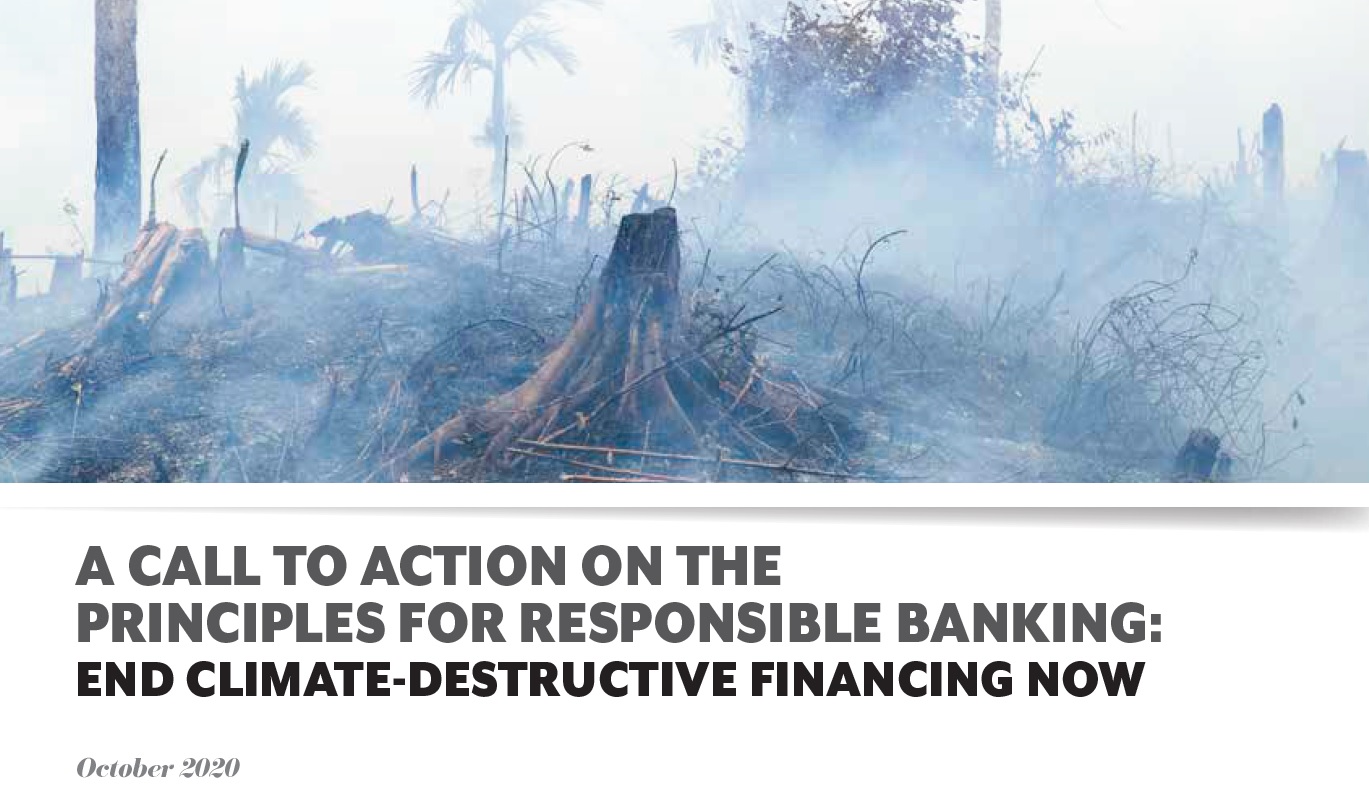Actualités
A Call to Action on the Principles for Responsible Banking: End Climate-Destructive Financing Now

In September last year, the United Nations Environment Programme Finance Initiative (UNEP FI) and 30 ‘’founding’’ banks launched the Principles for Responsible Banking (PRBs) during the United Nations General Assembly in New York. Starting out with 132 signatories, 193 banks and counting have now adopted the six principles that comprise the PRBs. This includes a commitment to align the bank’s business strategy with the goals set out in the Paris Climate Agreement and the Sustainable Development Goals (SDGs).
Civil society organizations welcomed the initiative at its launch, but cautioned against the risk of greenwashing in the absence of clear criteria for PRB implementation and robust transparency and accountability by the PRB banks. One year later, analysis shows that at least 20 PRB banks continue to be on a trajectory of climate destruction, and continue to finance projects that are in blatant disregard of climate, biodiversity and human rights impacts.
A briefing published today by civil society organizations calls on signatory banks to set meaningful targets that genuinely align the bank with the Paris Climate Agreement and SDGs, to take measures to facilitate stakeholder engagement and respect all human rights and the specific rights of Indigenous People, and to be as transparent as possible about their progress in implementing the Principles.
To ensure that the PRBs deliver with the urgency required to solve the world’s most pressing crises, the briefing makes the following recommendations to the UNEP-FI Secretariat and the PRB Banking Board:
- Adopt a clear definition of what it means for a PRB bank to be aligned with the Paris Climate Agreement and the Sustainable Development Goals (SDGs) and have banks reflect this in their setting of targets. This should be in accordance with the Principles for Paris-Aligned Financial Institutions, a civil society statement endorsed by 60 organizations which calls on banks to end the financing of fossil fuels and deforestation. Such a definition should also include an explicit commitment to respect human rights, including Indigenous rights, in accordance with the UN Guiding Principles on Business and Human Rights and the UN Declaration on the Rights of Indigenous Peoples.
- Maximize transparency and accountability of PRB banks. This should include a publicly available and reliable contact for each PRB bank, detailed reporting on the bank’s progress towards meeting the PRB goals, and escalating measures to enforce the Principles, with an initial focus on reporting and stakeholder engagement.
- Require banks to take measures to facilitate stakeholder engagement, irrespective of the to-be-established PRB civil society advisory body. This should include a requirement for banks to establish a grievance mechanism that is accessible to impacted communities and other concerned stakeholders.
- Incentivize banks to adopt a shorter timeline for implementation, prioritizing high risk sectors and adverse impacts based on the severity and likelihood of the impact on climate change, biodiversity and human rights.
- Establish clearer thresholds for banks that join the initiative going forward. This should include a requirement for banks to make a public commitment to align with the Paris Climate Agreement and the SDGs and publish its overarching strategy for doing so prior to joining the PRBs.
Find the full civil society briefing paper here.
This briefing has been endorsed by: Rainforest Action Network, BankTrack, Accountability Counsel, Amazon Watch, Divest Invest Protect, First Peoples Worldwide, Friends of the Earth US, Indigenous Environmental Network, Japan Center for a Sustainable Environment and Society (JACSES), London Mining Network, Reclaim Finance, Sierra Club and Women’s Earth and Climate Action Network (WECAN).